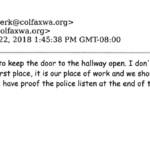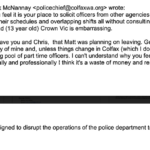Public email records and civil service filings reveal a culture of distrust at Colfax City Hall that has resulted in department heads leveling repeated accusations of lying, mismanagement, budget errors and retaliation throughout the past two years.
Interpersonal disputes have contributed to high turnover, low morale, staffing shortages, lost funding and legal liability. Former city employees say conflicts have also hindered long-term planning and staff’s ability to serve the public.
Many of these issues came to light in the wake of Colfax Mayor G. Todd Vanek firing Police Chief Rick McNannay in January over allegations of dishonest hiring practices. The city’s Civil Service Commission overturned the termination in July, citing a pattern of political retaliation.
Email records outline multiple conflicts between McNannay and city Finance Director Chris Mathis, who has also served as interim City Administrator since spring of 2018. Both Mathis and McNannay have accused the other of lying, mismanagement or attempting to “set up” the other.
Several disputes seemed to spill over into broader disagreements between City Hall and police department staff. At one point, Vanek had to issue a general order to keep open a hallway door between city office staff and the police department.
City council candidates alluded to some of the ongoing tensions in a campaign forum last week, but many details have not been previously disclosed publicly.
For this report, Whitman County Watch reviewed more than 1,200 pages of city emails and meeting records as well as another 500 pages of recent Civil Service Commission filings (which included duplicates of some city documents or emails). WCW also attended multiple Civil Service hearings and Colfax City Council meetings on these matters.
Vanek, Mathis and other department heads declined multiple requests for comment. McNannay declined to comment due to his related lawsuit against the city. Two former city employees spoke with WCW, requesting anonymity to avoid complications at their new jobs in other communities.
“It’s just dysfunction junction,” one former employee said about the City of Colfax. “They sabotage themselves. … It’s just the most insane thing I’ve ever seen.”
Staff turnover and tension
The City of Colfax has about 20 full-time employees across administrative, police, fire and public works departments. A part-time mayor and city council members appoint full-time department heads such as the police chief or finance director. Some department heads now earn about $75,000 a year while the part-time mayor position receives about $7,000 a year. City administration, police and fire all operate out of a single building, City Hall, along Mill Street.
Multiple department heads and other employees have left the city since 2017, some after less than a year in their positions. Former city administrator Dodd Snodgrass resigned in February 2018 after seven months. The previous city administrator left at the end of 2016. Former Fire Chief Steven Thime resigned in June 2017 after about six months on the job.
Mathis, first hired in 2015, has now served as both Finance Director and City Administrator for about 19 months. McNannay spent nearly 10 months of the past year on either paid administrative leave or terminated status before returning to duty in August.

Two deputy clerks and at least four full-time police officers, in addition to some part-time officers, have left since 2017. City Councilwoman Sarah McKnight also resigned in January 2018 over alleged city official retaliation.
“Sadly, the mayor’s need to control other human beings has become a greater priority than leading the city into a positive thriving state,” McKnight wrote in a resignation letter, as reported by the Whitman County Gazette.
Both former city employees who spoke with WCW said they chose to leave their jobs over poor city leadership and its impact on morale. They described staff turnover as “much higher” in Colfax than other cities.
“It’s just gross mismanagement and hostility,” one said.
“It’s a very tense place,” the other said. “It completely wore me out.”
Email records indicate consistent conflicts between interim City Administrator Mathis and Police Chief McNannay over budget management and professionalism. Both Mathis and McNannay have received strong support from different factions of current and former staffers.
One former employee called Mathis “vindictive” while others argued she had implemented overdue improvements to city practices. Alternatively, McNannay was praised for advocating for his officers while ignoring budget limitations and falling behind on administrative duties.
“He was always difficult,” one employee said, “but his heart was in the right place.”
Department heads would routinely ask for Vanek to mediate arguments, records show. His efforts would sometimes ease tensions, but also often led to new complaints of micromanagement or interrupting the chain of command. Former employees described his leadership as sometimes erratic or overbearing: “He’d have these knee-jerk reactions to things.”
Tensions peaked in February 2018 over a suspicious package incident (see below), an ongoing wage dispute with McNannay and other personnel conflicts. Snodgrass had recently resigned as city administrator. McNannay had also outlined budget and morale concerns at a public meeting, which he was later reprimanded for.
A Colfax police officer, who has since left the department, emailed Vanek at the time to explain all relations between the police and front office staff had broken down.
“It’s been brought to my attention that there have been unwarranted unfriendly and inappropriate comments and actions by our administrative professionals in the front office at City Hall,” the officer wrote. “I am gravely concerned for the well being of my officers and am instructing them to cease communicating with front office staff for any reason except an emergency involving an immediate threat to life or property.”
City Clerk Lynda Kramlich soon after asked Vanek to permit them to close the door separating the departments.
“Can you please lift your order to keep the doorway to the hallway open. I don’t feel like this needs to be an order from the mayor in the first place,” she wrote in an email, adding, “We have proof the police listen at the end of the hallway to our conversations and use it against us!”
Suspicious package incident
On Feb. 19, 2018, a slim cardboard package, a little over two feet in length, appeared outside Colfax City Hall. It was addressed to then-Municipal Court Judge John Hart, but did not have a postmark from any postal service handling. Records show city employees realized the next day, Feb. 20, it might contain an explosive device or hazardous substance.

After learning of the package, McNannay announced that no one should touch it while he tried to track down surveillance footage of who left it, investigative records state. Mathis later decided leaving the package in the main office was too risky and moved it to another room.
When McNannay could not find any footage, he later reportedly cut open the box and found a poster that was intended as a gift for the judge.
The Pullman Police Department, at Vanek’s request, later conducted a review of the incident, concluding city employees properly identified a potential risk but then allowed the situation to slip into casual disarray. Read the entire 35-page review with witness statements.
“A take charge attitude could have … set a tone, where this event could have unfolded without confusion,” the review concluded. “Overall, don’t lose sight that the incident ended with a positive result.”
In the days after the incident, McNannay accused Mathis of disregarding his order to stay away from the package. He sent an email to Mathis and Vanek suggesting she could face arrest for obstructing a law enforcement officer.
“Given SOLELY the fact that we are coworkers I chose, instead, to forward this [to] your supervisor, the Mayor, to handle internally,” McNannay wrote. “If he instructs me to handle this incident the same way I would handle any other incident involving the general public I will do so.”
Mathis contended she was not present during McNannay’s announcement and felt the package presented a risk to staff. She also noted the box had already been moved multiple times without incident and accused McNannay of abusing his authority.
“Since you are entertaining letting [McNannay] arrest me for disobeying an order not given,” she wrote to Vanek, “I feel that we can no longer work with Rick when he is making obvious attempts to set us up and is up to no good. … This is such a misuse of power, can you not see what we are being subject to?”
Vanek later met with employees to introduce new protocols for suspicious packages. Emails indicate McNannay still doubted Mathis’s account of the incident.
“[Mathis] will lie when under pressure,” he wrote to Vanek in May 2018. “I have a hard time working with, and especially for, dishonest people. You should too.”
Budget conflicts
State audit records show the City of Colfax struggled to track budget spending in the years prior to 2016, leading to financial inconsistencies and a lack of accountability. Auditors reported in 2017 that records reflected hundreds of thousands of dollars in annual budget overruns and officials could not attest to the accuracy of many financial statements.

“The City experienced turnover in the Finance Director and City Administrator positions,” a 2017 audit states. “City employees said they could not rely on reported transactions or the accounting records for [2014 and 2015] because of transactions that were unsupported, recorded incorrectly or not recorded at all.”
Some employees credit Mathis with clearing up the city’s financial standing and instituting improved oversight. But those efforts increasingly involved confronting McNannay about police department costs for staffing and equipment. A 2019 draft budget projection showed the four-officer department spending about $476,000 of the city’s total $3.5 million budget, or about 14 percent.
While McNannay repeatedly argued he did not have the resources to provide essential police services, city officials accused him of irresponsible scheduling and missing revenue opportunities.
“Even though the Police Department continuously received yearly budget increases, the Police Department continued to mismanage the budget, going over budget yearly,” Mathis later stated in a civil service declaration. “Examples of budget mismanagement include spending four to five times the yearly budget on part-time officers when there were fulltime officers available to fill all shifts.”
And despite the city’s reputation as a speed trap, records show the police department brought only about half of its expected $110,000 in traffic infraction revenue for 2017.
City officials also admonished McNannay for signing a security contract with Whitman Hospital despite staffing shortages and missing a deadline for a $19,000 training reimbursement grant. McNannay pushed back in December of 2017 in an email to city council members, stating he had managed appropriately given the resources available.
“I have provided you with documentation that at this point we are a reactive department in survival mode,” McNannay wrote. “I worked 72 days by myself (equating to 5 months). … To be able to manage time, assumes that there is discretionary time, of which there is not.
“Quite frankly I am getting very tired of allegations and innuendos inferring I do not know how to manage time, live within a budget or run a police department….by people who have no clue, nor do they care, what my day consists of.”
When McNannay raised his concerns about police resources and budget support before the city council in February 2018, City Clerk Kramlich later confronted the mayor via email over not supporting Mathis during the discussion.
“I am really bothered by the fact that one department head can attack another in open public meeting with no chance to defend themselves or you stepping in and defending the person being attacked,” she wrote to Vanek. “We know that Chris [Mathis] has totally cleaned up the finances for the City and she should be applauded for that fact!”
Police department management
Records suggest Vanek, while also working a full-time job at WSU, became more hands on with the police department throughout the spring of 2018 — leading to new conflicts over staffing and chain of command. Emails show Vanek would check in on what officers were investigating and push them to prioritize certain citizen complaints.
“We now have a citizen who insists on contacting the mayor instead of the Police Department,” one officer wrote in March 2018. “This reduces our credibility and I am frankly offended by his interference in police matters.”
In April 2018, Vanek reportedly ordered McNannay to cease abandoned vehicle code enforcement until they could discuss how to handle them. McNannay responded he would forward all such complaints to the mayor. Vanek lifted the ban the next day.
As the department continued to struggle with staffing, Vanek also sent emails to other local law enforcement agencies asking for part-time help. McNannay accused the mayor of overstepping his role and undermining his efforts to set up a long-term plan for covering shifts.
“He’s very much a micro-manager, but he isn’t there enough,” one former employee said of Vanek. “He would try to get involved in stuff that frankly had nothing to do with him. It’s unfortunate.”
Colfax later signed an interlocal agreement with the Whitman County Sheriff’s Office in October to cover some city patrol shifts when needed.
City officials say they also discovered last year that Colfax police officers, including McNannay, had failed to meet state standards for completing 24 hours of annual training in 2017.
Civil service filings show Vanek drafted at least two letters of termination for McNannay in 2017 and 2018. He also wrote four letters of reprimand or evaluation reports criticizing McNannay, but never delivered them “on advice of counsel.” Some of those letters accused McNannay of alerting press to controversial meetings and provoking conflict. Read the city’s account of complaints against the chief.
McNannay also clashed with city officials over a $3,000 claim for overtime hours worked during WSU football games. WSU pays many local agencies to provide extra patrols or security during games. As chief, McNannay signed off on such contracts for himself and other Colfax officers.
City officials argue state law prohibits McNannay from signing city contracts that would benefit himself financially. Civil service declarations from Vanek and Mathis state they also told McNannay he could not collect the hours as city overtime, but could potentially work as an independent contractor.
Records state McNannay contends city officials told him he would receive payments for extra security work done on behalf of the city’s WSU contracts and that payments would “pass through” the city. The chief at one point threatened a lawsuit.
Officials also questioned whether officers could safely work the extra game shifts when already scheduled to cover regular patrols. Mathis told attorneys at least one Colfax officer missed his shift following a game.
“An officer was so exhausted from working the WSU football games, that officer could not work his shift for the City,” she stated, “thus leaving the City without Police coverage.”
McNannay’s civil service appeal
With little explanation to the public, Vanek placed McNannay on immediate paid administrative leave in October of 2018. City officials say they discovered the police chief had hired four part-time officers in 2016 without conducting the psychological evaluations and background checks mandated by state law. McNannay argued those officers all worked or recently worked at other local police agencies and had previously completed the checks. He said he did not realize state law required new checks.
When filing the hiring paperwork with the state in 2016, McNannay acknowledged the uncompleted background checks. A state certification officer suggested moving forward by submitting the forms, but emphasized future hires needed the checks. The chief sent that information to city officials.

In 2018, Vanek asked the city’s insurance provider to investigate whether the hiring forms, signed by McNannay, amounted to perjury. The Clear Risk insurance investigator concluded the chief had acted dishonestly. The mayor then fired McNannay.
“My objective was never to get rid of Chief McNannay,” Vanek stated in a declaration. “Rather, my objective was to fix substantial problems with the Police Department. However, every time I offered to help Chief McNannay with better organizing the Police Department, Chief McNannay consistently told me I had ‘no idea what they did back there.’”
McNannay appealed his termination to the city’s Civil Service Commission. Bob Dunn, a Spokane attorney specializing in wrongful termination, argued the city has dredged up a lot of old complaints to try to retroactively justify firing McNannay. City officials did not take any formal steps at the time, but only after the chief spoke out publicly about budget issues and submitted his claim for the WSU payments.
“[T]he City’s newly stated and prior justifications for terminating Chief McNannay are mere pretext,” Dunn wrote in July. “The evidence is clear that Chief McNannay was actually terminated in bad faith for political reasons, in retaliation for his wage claim and the exercise of his First Amendment Rights.”
The three-person Civil Service Commission collected evidence and statements before issuing a summary judgment in July, ruling the city had not acted in good faith. They released a written opinion in August.
“No evidence has been presented …,” the opinion states, “that Chief McNannay acted with a lack of honesty or integrity or with a disposition to defraud or deceive regarding the forms he signed in 2016.”
The commission also outlined the history of personnel conflicts between city officials over compensation, budget resources, chain of command and the suspicious package incident.
“Vanek’s written record of attempting to find a basis to discharge or demote Chief McNannay for a year prior to his actual discharge, the City’s willful failure to complete a thorough and fair investigation, and the City’s failure to afford Chief McNannay with procedural due process,” the commission concluded, “are convincing evidence of political reason for the discharge.”
McNannay has since filed a claim toward a $5.2 million lawsuit. Vanek announced he will not seek another term. James Retzer, a Washington State Patrol trooper, is now running unopposed for the mayor’s seat.
One former city employee suggested officials begin a candid conversation with the citizens about what the city can afford and what standards it wants to uphold for services.
“It they could just clean themselves up and quit with all of this drama,” the employee said, “they could make an awesome city.”







Looney Tunes for sure
What a mess. Lots of drama when everyone should be concentrating on doing their jobs on behalf of the public. I believe a lot of this lies at the feet of the council and Mayor. We should vote out the sitting long-term councilmembers (Kackman, Huntwork) this election. If the budget is that tight on Police, I hope Retzer and new councilmembers have a discussion about how to increase budget for PD with new Revenue (special levy). Police and Fire operations are key for a community’s survival. With the skeletal staffing, I have noticed an uptick in shady activities across town and none of the electeds give a rip. The decline of PD will end up leading to the decline of the City. Businesses will only establish and residents will only move into town and stay if they feel safe. I know right now I do not!